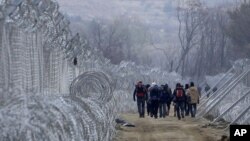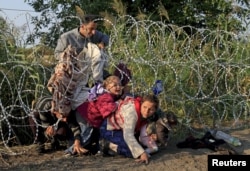The migrant crisis, serious economic problems, and Russia's return to authoritarianism are threatening the stability of governments in Central Europe and Eurasia, and the existence of the European Union.
That is the message of "Nations in Transit 2016," the latest annual survey of democratic governance from Central Europe to Eurasia by international rights group Freedom House.
“Renewed nationalism and the erosion of freedom of movement and other fundamental principles are threatening the consolidation of democracy in Eastern Europe, and with it the entire European project,” said Nate Schenkkan, project director of Nations in Transit.
Dictatorships
According to "Nations in Transit 2016," the biggest driver of decline in the former Soviet Union has been Russia's return to authoritarianism under President Vladimir Putin.
The report states that seven of the 15 countries of the former Soviet Union are currently headed by dictators who have been in power for at least 10 years.
Low oil prices, it says, are now threatening the stability of these authoritarian regimes.
“Governments in oil producers like Russia, Kazakhstan, Turkmenistan, and Azerbaijan built their economies on sand,” said Schenkkan. "The profit when oil prices were high went into the pockets of officials connected to the presidents. Now these states must face the consequences after years of failing to diversify their economies or create transparent and accountable systems of government.”
Ukraine
On the other hand, Ukraine remains "the single most important opportunity for establishing democracy in Eurasia," the report states.
It says Ukraine outperforms the average of official current and potential EU candidates in the region on three out of seven indicators: civil society, electoral process, and independent media.
But Ukraine scored worse last year on local democratic governance, corruption, judicial framework and independence, and national democratic governance.
“This is a pivotal year for Ukraine to take on corruption and impunity,” said Schenkkan. “Patience is running thin among Ukraine’s supporters. The government cannot lose the urgency of breaking with the past.”
Xenophobic rhetoric
According to Freedom House, the biggest challenge to democracy in Europe is the spread of "illiberal" politics. Hungary's Prime Minister Viktor Oban and several other Central European leaders used xenophobic rhetoric to denounce migrants last year, as the flow of refugees and migrants from the Middle East and North Africa increased sharply.
“Claiming that Europe faces a Muslim invasion has become standard fare for a range of politicians and political parties in Europe,” said Schenkkan. “This kind of speech undermines democracy by rejecting one of its fundamental principles, equality before the law. There is a danger that this kind of hateful, paranoid speech will lead to violence against minorities and refugees.”







